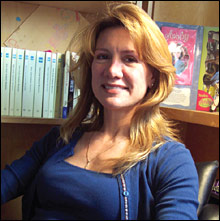Next: Supplying it on demand
Posted Jun. 19/07
While studying criminology at Simon Fraser University, Jane Dickson-Gilmore spent her master’s practicum time working for a judge in Whitehorse, Yukon. She was stunned to see so clearly the degree to which the justice system didn’t work for Aboriginal people, and she returned to academia with an activist fire burning.

- For periods from 1988 through 1990, Jane Dickson-Gilmore lived and worked in the Mohawk community of Kahnawake, experiencing the Oka Crisis land dispute while doing research for her PhD. This crisis, which was the result of a failed specific claim, helped spur the creation of the Indian Claims Commission, to which Dickson-Gilmore was later appointed in 2002.
In my youth, I like to believe I was an effective and energized activist thanks to a certain measure of tunnel vision,” she reflects. “We needed to change a lot of the things we were doing, especially with regard to the criminal law; we needed to work toward a fairer legal system, and a fairer society. And while I don’t think most of us need a university education to know what is fair, education can help us to understand the social, political and legal forces which can lead to an unjust society, and thereby to the things we must work on to make our society a better place.”
Through her research, work with Aboriginal communities, and earning a doctorate in law from the London School of Economics, Dickson-Gilmore came to believe that being balanced and neutral is also a form of activism, one that fosters a just resolution to problems
“A willingness to hear people and look at the constraints under which decisions were made came with age for me,” says the associate professor in the Department of Law. She tries to impart the importance of being open-minded to her students studying conflict resolution, aboriginal community and restorative justice, and the Canadian criminal legal system.
For Dickson-Gilmore, fairness underpins her work. Appointed as a Commissioner of the Indian Claims Commission (ICC) in 2002, she works as part of the independent body to look into First Nation claims of breach or non-fulfillment of government obligations that have been rejected by the Crown. Before the creation of the ICC, First Nations were unable to challenge government decisions without going to court.
As an alternative appeal process that doesn’t involve a lengthy court hearing, the ICC examines the claim in depth, pulling together documentary research, going into the community to hear from Elders and witnesses about the impact on the community, and getting a physical sense of the disputed land. A panel of three commissioners hears legal arguments, deliberates and produces a report to present its findings and make recommendations to the government. The ICC also provides a mediation service when an accepted claim goes to negotiation.
Rather than a win-or-lose, all-or-nothing system, the ICC strives to find a middle ground that addresses the issues of both sides.
“We look at the evidence dispassionately; measuring the facts against the law, asking ‘Is there a lawful obligation which the Crown owes to this First Nation?’” says Dickson-Gilmore, “but we’re not restricted to the law. We can comment on moral obligations and the Honour of the Crown as well, particularly when legal obligations have been met at a minimum and may reflect poorly on the Crown.”
One of the strengths of the ICC is the balance of backgrounds, training and education of its members. “Not all commissioners are lawyers, so we see the world differently and provide different perspectives,” says Dickson-Gilmore. “I believe strongly in the work done by the ICC, and I very much hope that I can make a difference through my involvement in that work, and move Canada toward more just society for Aboriginal and non-aboriginal Canadians.”
—
Fast fact…
Jane Dickson-Gilmore has served as an advisor for the Oujé-Bougoumou Cree First Nation Community Justice Project and provided expert advice on Kahnawake Mohawks to the Smithsonian Institution National Museum of the American Indian. She has been called upon to present before the Standing Committee of Justice and Human Rights and has been an expert witness in proceedings before the federal court and Canadian Human Rights Commission.